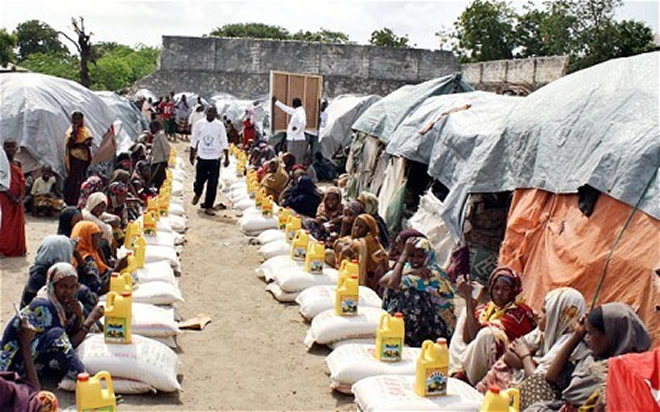

Friday, July 10, 2015
With the support of the Kingdom of Saudi Arabia, WFP has given 212 metric tonnes of dates to the refugees in Dadaab. Dates are traditionally used for breaking the fast during Ramadhan. The fruit is considered beneficial for its high levels of natural sugars and therefore appropriate for Iftar, the fast-breaking meal.
"I can tell that the food is reduced just by looking at the bag. I normally get about twice this amount," said Halima Aden Gure, a 29-year old mother of six.
Halima is one of the 350,000 refugees living inside the expansive Dadaab refugee camp in North Eastern Kenya. She fled here at the height of the drought and famine that ravaged parts of Somalia four years ago. It is her turn to collect the family's share of food. The portions are measured as per the size of the family and are given out twice in a month.
In mid-June, WFP reduced the overall size of the ration by a third due to a shortage of funds. The reduction affects the cereal in the so called ‘food basket' - on this day wheat flour.
Even when the ration is full, Halima said that it is never enough. "I have six children and my husband does not have a job. I have to borrow from my relatives. It will be harder now that we are getting a smaller portion."
Dates for Ramadhan
This is the second food distribution cycle in the month of June, and it coincides with the start of Ramadhan, the holy month of fasting for Muslims. "Even though I got less flour than usual, I'm excited that I received two packets of dates. I was hoping for the dates, since it is the beginning of Ramadhan," said Halima with a smile. "We got dates last year as well, so it is now becoming a tradition."
Dates are traditionally used for breaking the fast during Ramadhan. The fruit is considered beneficial for its high levels of natural sugars and therefore appropriate for Iftar, the fast-breaking meal.
Halima is delighted that she has two packets of dates, each weighing two kilogrammes, though at the same time she wondered if they will last her for the full Ramadhan period. "I will stretch the two packets for as long as I can, and for the rest of the days, I will cook porridge," she explained.
With the support of the Kingdom of Saudi Arabia, WFP has given 212 metric tonnes of dates to the refugees in Dadaab. A family of six received a two-kilo pack while the largest family - that of 16 - received five packets. This is in addition to the US$10 million that the Kingdom of Saudi Arabia donated to WFP early this year.
Risk of prolonged cuts
Louise Sowe is the head of WFP's office in Dadaab. "In the immediate term, we expect the refugees to absorb the food reduction by drawing on the pre-existing coping methods, for instance skipping one meal a day. However, we are concerned that if this ration cut is prolonged or deepened, these survival tactics will become overstretched and then we will begin to see a decline in the nutritional status."
Many refugees, especially the larger families, depend on one another to fill the food gaps. Halima's priority is to feed the younger children first. "Three of my children are in primary school, and luckily, they eat porridge in school," said Halima. "It is common for us to eat together as neighbours."